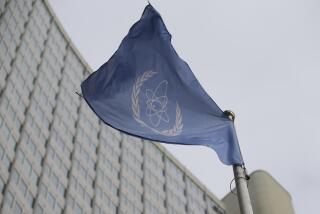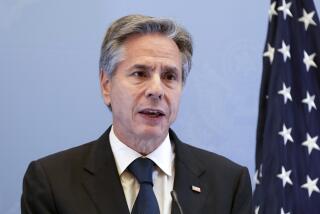Iran nuclear talks still face obstacles, U.S. official says
A top U.S. official cautioned Tuesday that obstacles remain before a nuclear deal can be reached between Iran and six world powers and warned that the widespread optimism about the four-month-long negotiations has gotten “way out of control.”
Though it appears that Iran and the six powers whose representatives are gathered this week in Vienna all want to draft a deal, “having the intent doesn’t necessarily mean that it will happen,” the official, who declined to be identified under Obama administration ground rules, told a group of reporters.
“There are still some significant gaps.… We’re working hard but it remains to be seen if we’ll get to where we’re hoping to get to.”
The six world powers -- Britain, China, France, Germany, Russia and the United States -- are seeking a deal that would lift international economic sanctions on Iran in exchange for curbs to prevent it from gaining a nuclear bomb-making capability. The group, which signed a preliminary agreement last November, is aiming to complete the final deal by July 20.
The seven countries are grappling with about half a dozen contentious issues. They include how much nuclear capability Iran will retain; the pace at which the sanctions are lifted; the duration of the deal; how Iran’s nuclear infrastructure will be monitored; and the fate of the Arak heavy water nuclear research reactor that the West fears could be used to generate plutonium fuel for a bomb.
Many analysts say the July date is ambitious given the complexity of the subject and the differences between the sides on key issues.
But many diplomats and analysts also have become optimistic during negotiations that began in January, as it has appeared that the Iranian government is serious about relieving the crushing burden of sanctions on the country. Though Iranian officials continue to complain publicly about Western demands, they have met all the requirements of the deal in the last four months.
The optimism could lead to disappointment and damaging criticism of the Obama administration if the talks fail. Some U.S. lawmakers, Israelis and others skeptical about the negotiations have become alarmed at the signs of progress, worrying that the administration is preparing to sign on to a lax deal in hopes of defusing a threat that could lead to war.
If the negotiations collapse, there could be damaging political blow back for President Obama and Iran’s supreme leader, Ayatollah Ali Khamenei.
Khamenei, while authorizing President Hassan Rouhani to seek an agreement, has also distanced himself from the effort by laying out tough demands and making clear to the public that it’s up to his subordinate to try to get a good deal. Obama, meanwhile, has talked down the odds of a successful negotiation, and said he’s preparing to move on to alternative approaches for limiting Iran’s controversial nuclear program if the countries represented in Vienna cannot agree on a solution.
The U.S. official insisted that the administration would sign an agreement only if Iranian officials agreed to the steps necessary to guarantee that Iran will never gain a nuclear weapons capability. The official sought to discourage speculation in the weeks ahead about which contentious issues have been resolved, saying that no single issue could be dealt with conclusively until the final details of the agreement were reached.
Sergei Ryabkov, the Russian deputy foreign minister, said this week that the issues of the heavy-water reactor and the monitoring are closest to being resolved, Russian press agencies reported.
This round of talks began Tuesday with private discussions among the six world powers on what terms they will offer Iran. Formal negotiations begin Wednesday morning and are expected to wrap up Friday.
More to Read
Sign up for Essential California
The most important California stories and recommendations in your inbox every morning.
You may occasionally receive promotional content from the Los Angeles Times.










